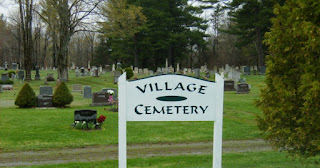Many of you know that in 2017, we had found my mother was a half-sister to her sibling and her biological father was a neighbor to her parents in Charleston, Maine. It was during our meeting with her half sister, Carol and her daughters that I learned Carol's husband was the son of a Berdina Skinner. My grandmother was Ethelyn Skinner of Exeter, Maine. They told me that an uncle had traced their Skinner line back to a John Skinner of Lewiston, Maine which made me realize that I had another connection to these cousins as I am also a descendant of the same John Skinner. Tracing our lines, we found our grandmothers were 2nd cousins.
I began to trace some of the other lines of descent from John Skinner as well. I came across two of his grandchildren had married each other (Yes they were 1st cousins). My interest was drawn to the Civil War pension of George Skinner of Weld, Maine on behalf of his son, John Francis Skinner's military service. It was interesting that his pension request was denied twice. So I requested copies of the pension from the National Archives. Upon receiving the pension records I discovered a tragic story of a pension being denied because George was not John's biological father. Despite testimony from friends and neighbors that George had always been known as John's father and no one knew anything different. Also John had helped George by sending money to help him before his death in the war. By the late 1870s, George Skinner was in poor health and in need of financial support. He petitioned twice because a commission asked the case be re-opened on the grounds that if John had supported George before his death as his known father, then it should be considered.
Here is what is known about the family:
George Skinner was born 27 March 1812 in Danville [now Auburn], Maine, the son of Andrew and Wealthy (Green) Skinner, grandson of John and Catherine (Jordan) Skinner. He married Susan M. Skinner on 18 May 1833 in Topsham, Maine. Susan was born about 1811 in Topsham, Maine, daughter of David and Lucy (Graves) Skinner, granddaughter of John and Catherine (Jordan) Skinner. The Vital Records of Topsham, Maine show two marriage intentions for Susan.
Her parents marriage intentions are recorded as well. Susan and a John Latchford of Bath, Maine intentions in 1830, but no record of marriage. Then the intentions between Susan and George Skinner in 1833. The pension of George Skinner contained the marriage date for him and Susan of 18 May 1833 in Topsham, Maine. A John Luchford was living in Bath, Maine on the 1830 census, but does not appear again or in any other records in Bath or Topsham, Maine.
Susan gave birth to John Francis Skinner in 1831 in Topsham, Maine, but no record of his birth has been found in records and births of single mothers were rarily recorded nor is there any court records showing that Susan or her family petitioned for any legal consequences for John Latchford being the father of her child. However, Susan married her cousin George Skinner and they removed to Carthage, Maine as well as Susan's parents.
In 1850, Susan Skinner was living in the household of her parents with her son, John Skinner, but George was not recorded with them, but appears living in Harpswell, Maine working and living alone as it appears he had to find work that year away from his family to support them.
Susan Skinner died 15 April 1857 in Carthage, Maine was buried with her parents there. George remarried on 27 November 1858 in Weld, Maine. He was living with Harriet on the 1860 census of Carthage, Maine and from testimony from George's neighbors, John Skinner had moved to Massachusetts to find work at this time.
John Francis Skinner enlisted on 2 April 1864 as a private in Company E, 32nd Maine Infantry regiment of volunteers. This regiment was involved in many major battles of that year from the Battle of the Wilderness, Spotsyvania, and seige of Petersburg to name a few. The regiment took aprt of the Battle of the Crater as it was known. Union troops besieging Petersburg, Virginia used a mine to blow a hole in the Confederate defenses. However the troops could not advance further and many were slaughtered at the bottom of the "Crater" in what one officer later described as a "turkey shoot". Rather than retreat, General Burnside sent in a division of the U. S. Colored Troops who were also trapped. Many were killed even after surrendering. As a result of this debacle, Burnside never commanded troops again.
John was captured on 30 July 1864 and taken to the Danville Prisons, Virginia.
Here is where John Skinner died on 25 August 1864 from disease.














